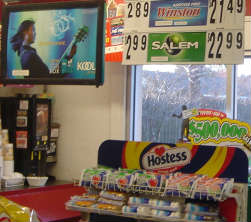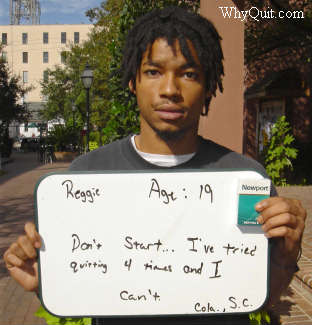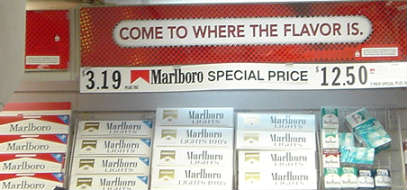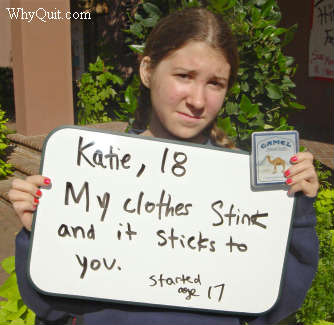
Convenience Stores: Nicotine Addiction Central
Page Two
Evaluating Store Nicotine Product Marketing
Whether evaluating a single store, a neighborhood, or an entire city, the initial step is for an individual or group to document and somehow rate the level of current marketing. StoreAlert.org provides a virtual convenience store tour that helps educate visitors to recognize different types of tobacco industry marketing, a "Report Card" to inventory and score stores and a "Training Guide."
StoreAlert's "Report Card" grades 9 different types of stores. It analyzes both exterior and interior marketing. Points are deducted based upon the presence of marketing, the type of marketing, its location, height, quantity and intensity. A score of 2 or less earns a grade of "A" while a score of more than 10 earns an "F."
Inexpensive digital cameras, the Internet and at least 50 web hosting services offering web page space for less than $5.00 per month allow any teen or tween to become an army of one in capturing, sharing and combating irresponsible nicotine product marketing in their neighborhood or community. Be sure to date all photos and inspection reports.
 WhyQuit.com offers an objective driven "Retail Nicotine Sales Grading" system. An "A" is earned when stores selling nicotine products totally deny access to all underage youth and employ no external nicotine marketing. A "B" is earned by locations that permit youth entry but refrain from all product marketing and keep all nicotine products hidden from view behind the counter. Stores which limit marketing to behind the sales counter can earn a "C," stores with interior signs not in the vicinity of candy, chips, snacks or sodas can earn a "D," and locations clearly targeting students receive an "F."
WhyQuit.com offers an objective driven "Retail Nicotine Sales Grading" system. An "A" is earned when stores selling nicotine products totally deny access to all underage youth and employ no external nicotine marketing. A "B" is earned by locations that permit youth entry but refrain from all product marketing and keep all nicotine products hidden from view behind the counter. Stores which limit marketing to behind the sales counter can earn a "C," stores with interior signs not in the vicinity of candy, chips, snacks or sodas can earn a "D," and locations clearly targeting students receive an "F."
To earn a WhyQuit grade of "C" or above a convenience store must meet one additional requirement. Stores must prominently display an interior warning sign which at last tells youth and young adults the truth about why almost all adult daily smokers smoke. Convenience stores have both moral and ethical obligations to teach youth that "smoking or chewing nicotine is highly addictive."
Inviting Stores to Responsibly Market Nicotine Products
A simple telephone call to a store could produce the owner's or manager's name, mailing address, fax number and email address. A student or youth group could then write a letter outlining what was found and sharing the store's grade. The letter could include photographs highlighting marketing concerns or actually share the store's full report. It could ask the store manager or owner to consider the impact of nicotine product marketing upon youth, the store's vicinity to neighborhoods, playgrounds, or schools, and invite the store to market nicotine in a responsible manner that minimizes its assault upon young and impressionable minds.
The brave at heart can call and request an appointment to share their findings. If you are a member of a student group consider bringing along the entire group and taking additional photographs during the meeting. Most convenience store operators want to be a valued part of the community.
Many store owners don't fully recognize and appreciate their store's role in fostering a community climate that glorifies, encourages and normalizes chemical dependency upon nicotine. Few have seen the addiction label on a Canadian cigarette pack. It reads, "Warning - Cigarettes are highly addictive - Studies have shown that tobacco can be harder to quit than heroin or cocaine." Most have never read scientific explanations teaching them how nicotine induced dopamine/adrenaline intoxication impacts many of the exact same brain pathways as other drugs of addiction. It's up to us to tell our convenience store managers the things their tobacco suppliers don't want them to think about.
But what if showing the store that its tobacco marketing is directly assaulting your community's youth fails to convince the store to market nicotine responsibly? What if the store prefers profit over your warnings that nicotine quickly enslaves young minds and that chemical dependency upon smoking nicotine is your community's leading cause of death? What next?
Coercing Stores to Responsibly Market Nicotine Products
 Options for convincing irresponsible stores to be responsible are limited only by your imagination. Picture a group of dedicated students legally picketing on a sidewalk in front of an offending store, while carrying signs and being cheered on by passing motorists. Imagine the group promising to return every Saturday until the store agrees to stop inviting youth to become nicotine addicts. Be sure to call the City Hall to see if a permit is needed to protest.
Options for convincing irresponsible stores to be responsible are limited only by your imagination. Picture a group of dedicated students legally picketing on a sidewalk in front of an offending store, while carrying signs and being cheered on by passing motorists. Imagine the group promising to return every Saturday until the store agrees to stop inviting youth to become nicotine addicts. Be sure to call the City Hall to see if a permit is needed to protest.
You can share your findings with the local newspaper, talk radio station and television stations. You can build a web page for each offending store, put up your pictures, and follow their progress in becoming responsible. You can write letters to the editor or call for a community boycott of the store. You may be able to get permission to put up your own counter-marketing sign on property near the store.
If you focus your energies on your neighborhood's most offensive store, publicity surrounding your victory might easily translate into numerous smaller victories as other stores seek to avoid becoming the object of your focus. Imagine the media coverage from a single successful campaign causing hundreds of nicotine marketing signs to fall.
Ordering Stores to Responsibly Market Nicotine Products
 What if public pressure doesn't work? Imagine filing a lawsuit in your small claims court seeking a court order to enjoin the store from marketing nicotine to youth. You may find an attorney who deeply believes in your mission, who is willing to handle the case for free (pro bono). Your law may permit you to make a claim that deceitful ads hanging above candy or chip racks constitute a "public nuisance."
What if public pressure doesn't work? Imagine filing a lawsuit in your small claims court seeking a court order to enjoin the store from marketing nicotine to youth. You may find an attorney who deeply believes in your mission, who is willing to handle the case for free (pro bono). Your law may permit you to make a claim that deceitful ads hanging above candy or chip racks constitute a "public nuisance."
Most tobacco ads are extremely misleading and our Supreme Court has repeatedly asserted that misleading advertisements are not protected. If the U.S. Department of Health is correct and 35 million American smokers are addicted to nicotine, while the total count of daily U.S. smokers is 37 million, then an honest statement would be that almost all daily smokers are addicted. In that case, it may be an "unfair and deceptive trade practice" for tobacco ads to suggest that the primary reason adult smokers smoke is for flavor, taste or pleasure.
 You can rebut the marketing claims. For example, if smoking were about taste and flavor, why do almost all smokers suck cigarette smoke deep into their lungs and hold it there? All taste buds are in the mouth; there are zero taste buds in the lungs. Smoke is held in the lungs so that nicotine can transfer into the bloodstream and quickly shoot up to the brain's dopamine pathways. So what about pleasure? That dopamine rush may feel good at first, but once a person become addicted, nicotine feedings aren't about pleasure but staving off the hurt of withdrawal.
You can rebut the marketing claims. For example, if smoking were about taste and flavor, why do almost all smokers suck cigarette smoke deep into their lungs and hold it there? All taste buds are in the mouth; there are zero taste buds in the lungs. Smoke is held in the lungs so that nicotine can transfer into the bloodstream and quickly shoot up to the brain's dopamine pathways. So what about pleasure? That dopamine rush may feel good at first, but once a person become addicted, nicotine feedings aren't about pleasure but staving off the hurt of withdrawal.
Another option is to check local zoning to see if exterior and or window product signs are regulated. Although the U.S. Supreme Court has declared that "States remain free to enact generally applicable zoning regulations, and to regulate conduct with respect to cigarette use and sales," when it comes to using zoning to regulate tobacco advertising (not use or sales) zoning laws must treat all commercial advertising in the same manner and cannot single out tobacco advertising.
 While zoning cannot single out tobacco advertising for special restrictions, it would appear that zoning could be used to require that all nicotine products be sold in stand alone type stores, as is done in most states with hard liquor. The stores could also be required to deny youth access (see WhyQuit's Denormalization Ordinance). Your town, city or county may also be able to zone nicotine sales so as to require its sale outside of all residential, community commercial and general business districts and require its sale only in industrial districts, just as zoning regulates other adult-only businesses.
While zoning cannot single out tobacco advertising for special restrictions, it would appear that zoning could be used to require that all nicotine products be sold in stand alone type stores, as is done in most states with hard liquor. The stores could also be required to deny youth access (see WhyQuit's Denormalization Ordinance). Your town, city or county may also be able to zone nicotine sales so as to require its sale outside of all residential, community commercial and general business districts and require its sale only in industrial districts, just as zoning regulates other adult-only businesses.
Additional local or state initiatives could attempt to raise the legal nicotine use age to 21. If smoked nicotine is nine times more addictive than alcohol (based upon a 10% alcoholism rate) and ultimately 10 times as deadly, does it make sense to allow its use 3 years earlier?
Historic data indicates that only 2% of all smokers started smoking after age 22. Raising the legal nicotine use age to 21, and aggressively enforcing it, would gradually destroy the nicotine addiction industry as we know it. Mature minds are, as a whole, too experienced to buy the lies.
Passing State and Local Ordinances to Ban the Sale of Nicotine
If local stores refuse to join communities in helping protect youth by de-normalizing chemical dependency upon nicotine, and local politicians refuse to utilize zoning and/or age restrictions to protect our young, then what options remain? In 2005 Washington state voters used the direct democracy tool of "Initiative" to bypass their legislature and enact the toughest statewide smoke-free indoor air law in America. Twenty-four states allow statewide voter initiative and a number of other states allow local initiatives. Imagine initiative (or referendum) as a tool to completely ban all sale of nicotine products.
Imagine a city, state or nation in which it is legal for individuals to grow tobacco and for adults to possess, use and share it, but illegal to sell tobacco or nicotine in any form. Such a measure could instantly destroy the tobacco marketing industry, remove tobacco products from all stores, and obliterate powerful economic forces that were compelled to target and enslave youth.
 The idea has recently been championed by Dr. Karl Heinz Ginzel, M.D., Professor Emeritus of Pharmacology and Toxicology at the University of Arkansas for Medical Sciences. With Dr. Ginzel's permission, I close with extensive select quotations from a 1997 article by Dr. Ginzel discussing granting the tobacco industry immunity from being sued.
The idea has recently been championed by Dr. Karl Heinz Ginzel, M.D., Professor Emeritus of Pharmacology and Toxicology at the University of Arkansas for Medical Sciences. With Dr. Ginzel's permission, I close with extensive select quotations from a 1997 article by Dr. Ginzel discussing granting the tobacco industry immunity from being sued.
"It is truly unthinkable that the tenets of the hallowed U.S. Constitution should ever be so subverted as to fit the schemes of an industry that wants to continue selling death with impunity," Dr. Ginzel wrote.
"It prevents us from admitting that none of the measures we are presently proposing or supporting will actually result in a tobacco-free society in the foreseeable future. If, for example, we endorse such lofty goals as to reduce teen smoking by 50% in a given number of years, we are at the same time condemning the other 50% to a life of addiction and premature death."
"Groups who battle the industry have virtually identical goals but are seriously split on tactics. Central to all is the goal of protecting children from tobacco. Since 90% of all adult smokers start smoking before age 18, in order to SAVE LIVES, NOT TOBACCO, children must be prevented from using tobacco in the first place. However, to expect this to happen is totally unrealistic as long as tobacco products are sold. In order to survive in its present form, the tobacco industry is simply forced to recruit the young, has done so in the past notwithstanding assurances to the contrary, and will do so in the future no matter what obstacles we are able put in their way."
"Some demand that the tobacco industry should be treated like every other corporation. As far as liability is concerned I couldn't agree more. Yet, if we pursue the argument to its inescapable conclusion, the picture becomes more complex. Wrongdoing by non-tobacco corporations has occurred and has been corrected in response to self-surveillance, litigation, and/or government intervention. Ford Pinto's gasoline tank, for example, was redesigned, medications that caused casualties were withdrawn, etc."
 "And here is the point where the tobacco industry differs from any other manufacturer. Since its products are inherently defective, i.e., harmful when used as intended, they cannot be made safe by any stretch of the imagination. Hence, the only way to prevent injury or death is to stop marketing tobacco products. Any type of settlement that endorses the continued sale of the deadly merchandise, be it cigarettes, cigars, spit or pipe tobacco ... fails to treat the tobacco industry like every other corporation."
"And here is the point where the tobacco industry differs from any other manufacturer. Since its products are inherently defective, i.e., harmful when used as intended, they cannot be made safe by any stretch of the imagination. Hence, the only way to prevent injury or death is to stop marketing tobacco products. Any type of settlement that endorses the continued sale of the deadly merchandise, be it cigarettes, cigars, spit or pipe tobacco ... fails to treat the tobacco industry like every other corporation."
"There is really nothing Utopian about taking action now. First of all, we have to discard the absurd idea that the tobacco industry is, by tradition, an indispensable part of the commercial landscape of America. [T]he demise of the industry in its present form would not cause irreparable harm to our economy." " In the absence of advertising, social pressure, and the enticement of smooth smokes, children would no longer enter the equation."
The Opportunity to Have Acted Responsibility is Slipping Away
Dr. Ginzel isn't the first to propose making the sale of tobacco illegal nor will he be the last. Although later repealed, Tennessee joined a number of other states in banning the sale of cigarettes in the late 1890s. William B. Austin was convicted of violating Tennessee's ban, fined $50 and appealed his case all the way to the Supreme Court, claiming that Tennessee's ban violated the power of Congress to regulate commerce.
On November 19, 1900, the U.S. Supreme Court held, "there is doubtless fair ground for dispute as to whether the use of cigarettes is not hurtful to the community, and therefore it would be competent for a state, with reference to its own people, to declare, under penalties, that cigarettes should not be manufactured within its limits. No one could say that such legislation trenched upon the liberty of the citizen by preventing him from pursuing a lawful business."
In November 2004 the nation of Bhutan became the first country on earth to completely ban the sale of tobacco. If greed continues to insist upon marketing dependency, decay, disease and death to America's youth they should fully expect a grassroots rebellion that those pushing nicotine will not be able to contain.
 1 | 2
1 | 2

